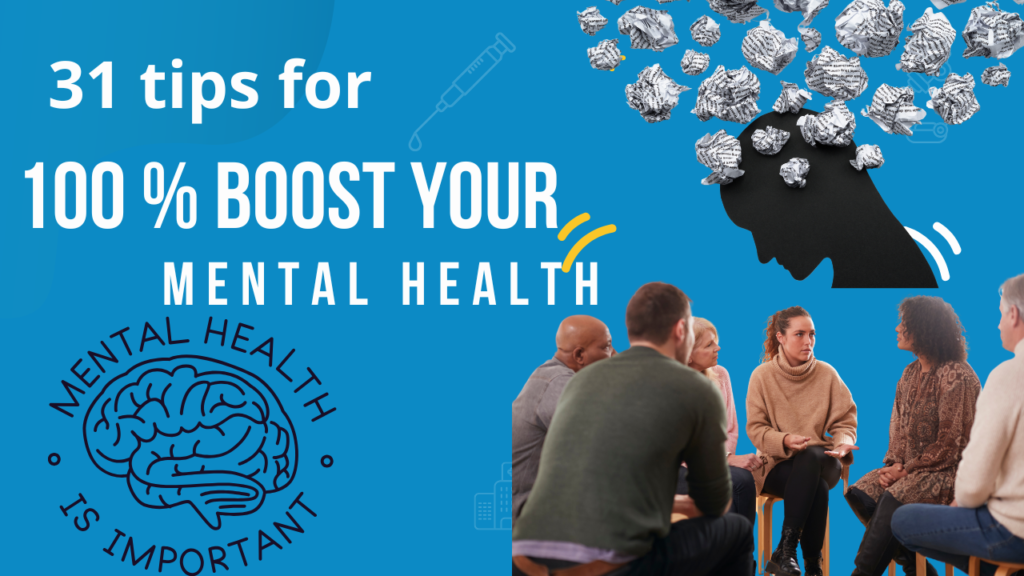How to Improve Mental Health is a crucial topic in today’s fast-paced academic environment. Prioritizing mental health ensures students thrive academically, socially, and emotionally. By fostering supportive environments, teaching stress management, and encouraging open dialogue, schools can empower students to build resilience and well-being for long-term success.
1. Keep a notebook to record accomplishments and thankfulness. Include 3 things you were grateful for and 3 things you were able to accomplish each day.
2. Mental Health- Have a cup of coffee to start the day. Coffee consumption is linked to lower rates of depression. If you can’t drink coffee because of the caff¬eine, try another good-for-you drink like green tea.
3. Set up a getaway. It could be camping with friends or a trip to the tropics. The act of planning a vacation and having something to look forward to can boost your overall happiness for up to 8 weeks!
4, Work your strengths. Do something you’re good at to build self-confidence, then tackle a tougher task.
5. Mental Health-To ensure a restful night’s sleep, keep it chilly. Between 60 and 67 degrees Fahrenheit is the ideal temperature range for sleeping.
6. “You don’t have to see the whole staircase, just take the first step.” King, Martin Luther, Jr. Determine what you can do to start along the path of improving a particular aspect of your life.
7. Mental Health-Try a new cuisine, compose a poem, paint, or work on a project on Pinterest. There is a connection between general well-being and creative expression.
8. Express affection to a loved one. A happy, healthy life depends on having close, high-quality relationships.

9. Mental Health-Treat yourself to a few pieces of dark chocolate every few days to increase your cognitive function. It is believed that chocolate’s flavonoids, caffeine, and theobromine combine to enhance mental clarity and alertness.
10. “Have an untold story inside of you is the worst pain in the world.” -Maya Angelou. Use the hashtag #mentalillnessfeelslike when posting about your own experiences with mental illness or recovery on Twitter, Instagram, and Tumblr. See what others have to say about it here.
.
11. Mental Health-Adding new activities isn’t always necessary to increase enjoyment. All we have to do is enjoy the ones we already have. Attempting to maintain optimism does not entail disregarding life’s less pleasant aspects. It just means giving as much attention to the good as you can.
12. Are you experiencing anxiety? To help you decompress, take a journey down memory lane and spend twenty minutes coloring. For the greatest effect, choose a geometric, slightly complex pattern.
13. Give yourself permission to laugh. Spend time with a humorous buddy, watch a comedy, or browse adorable videos on the internet. Anxiety is lessened by laughter.
14. Mental Health-Disconnect from the grid. Disconnect from the incessant emails, notifications, and other distractions by leaving your smartphone at home for a day. Engage in a pleasurable activity with someone in person.
15. While cleaning the house, dance around. Dancing not only helps you finish chores but also raises endorphins, the body’s “feel-good” hormones, and lowers cortisol, the stress hormone.
16. Feel free to yawn. According to studies, yawning increases mental efficiency and alertness while also cooling the brain.
17. Mental Health-Take a warm bath once a week to unwind. To relieve aches and pains and help increase magnesium levels—which can be lowered by stress—try adding Epsom salts.
18. Have you been bothered by anything? Put everything on paper. Depression symptoms can be lessened by writing about distressing events.
19. Have a conversation with a pet. Spending time with animals increases oxytocin, which promotes emotions of happiness, and decreases cortisol, the stress hormone. Volunteer at a shelter or spend time with a friend who owns a pet if you don’t.

20. “What lies within us is far more important than what lies in front of us and behind us. And miracles occur when you bring what is inside out into the world. Thoreau, Henry David. Being mindful means remaining “in the present.” Try these suggestions.
21. Visit your own town as a tourist. People frequently only visit sights while traveling, but you could be shocked to learn about the interesting things in your own neighborhood.
22. Consider choosing your workweek attire or preparing your lunches. You’ll feel more in charge of the upcoming week and save some time in the mornings.
23. Include some omega-3 fatty acids in your diet; among their many other advantages, they have been connected to lower incidence of schizophrenia and depression. Supplementing with fish oil is effective, but consuming foods high in omega-3s, such as walnuts, flaxseeds, and wild salmon, also promotes the growth of beneficial gut flora.
24. Show forgiveness, even if it’s simply to the individual who interrupted you on your way to work. Forgiveness is associated with improved mental health and life satisfaction.
25. “What appear to be calamities are often the sources of fortune.” Disraeli. Look for the positive aspect of a recent dreadful incident.
26. Are you under stress? Grin. Smiling can help you relax and lower your heart rate, even though it may not be the easiest thing to do.
27. Write someone a thank-you message to express your gratitude, not for a tangible gift. Gratitude expressed in writing is associated with higher levels of happiness.
28. Take part in a game, go to the park, or have a BBQ with your loved ones. On days when they spend six to seven hours with friends and family, people are twelve times more likely to feel pleased.

30. Use sunscreen and try your best to get 15 minutes of sunshine. Vitamin D, which is synthesized by sunlight, is thought by experts to improve mood.
31. “Anyone who has never made a mistake has never tried anything new.” -Einstein, Albert. To create space in your life for excitement and adventure, do something different.
How to Improve the Mental Health of Students is to create a balanced environment that supports both academic success and emotional health. By implementing practical strategies, fostering support networks, and promoting self-care, we can empower students to confront obstacles with confidence. Prioritizing mental health now builds a stronger, more resilient generation for future generations.
